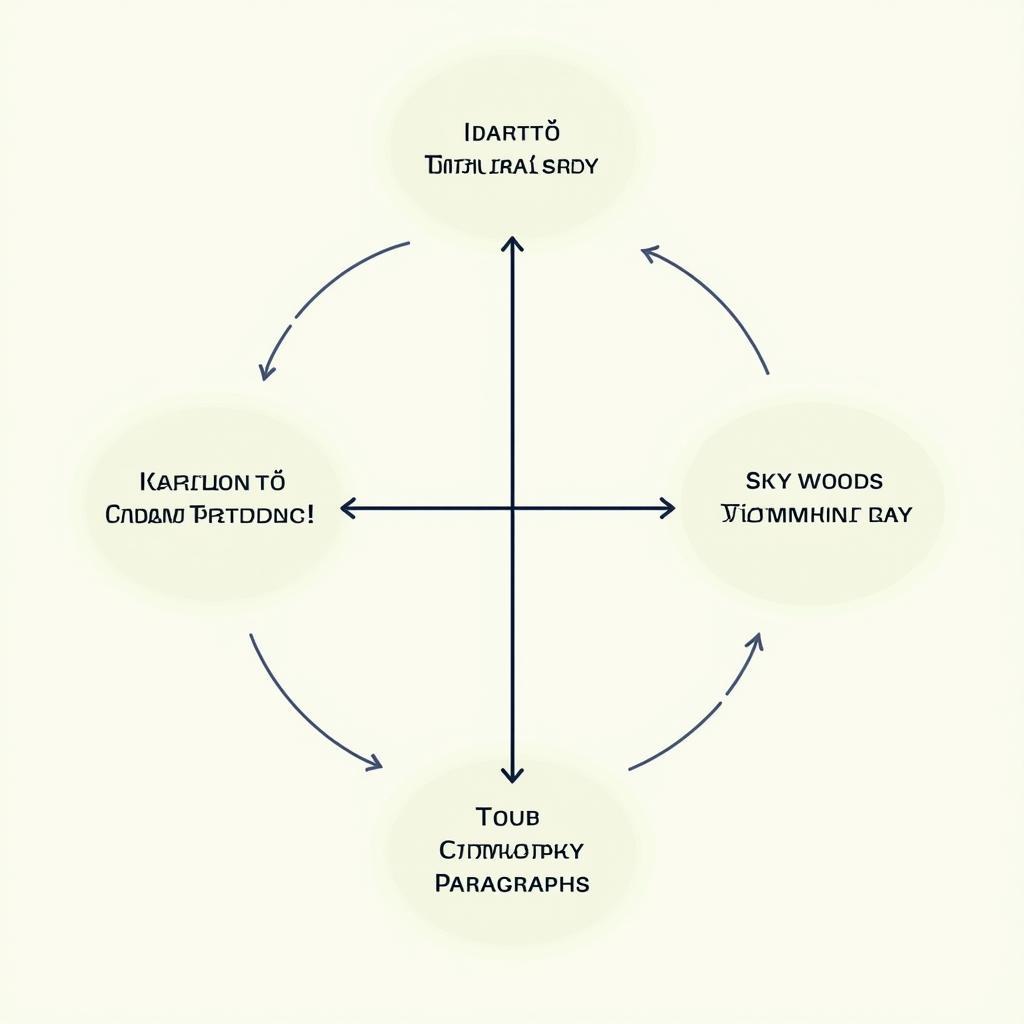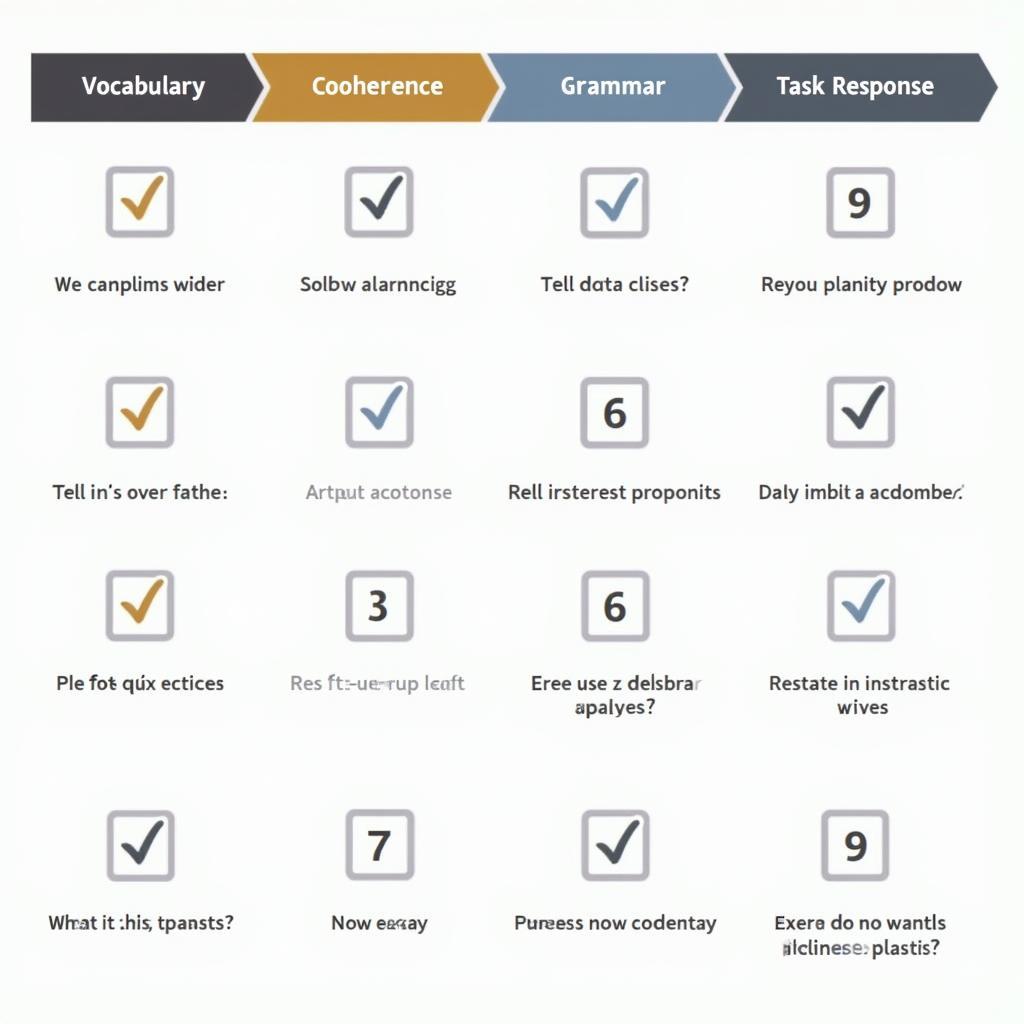Mở bài
Trong bối cảnh giáo dục đổi mới nhanh chóng, chủ đề Importance Of Soft Skills In Modern Education xuất hiện ngày càng thường xuyên trong IELTS Writing Task 2. Các kỹ năng mềm như giao tiếp, làm việc nhóm, tư duy phản biện và khả năng thích nghi không chỉ quan trọng trong lớp học mà còn là yếu tố then chốt của sự nghiệp lâu dài. Trong bài viết này, bạn sẽ học được: 3 bài mẫu hoàn chỉnh ở các mức Band 5-6, 6.5-7 và 8-9; phân tích chấm điểm theo 4 tiêu chí chính thức; từ vựng chủ điểm kèm collocations; 6 cấu trúc câu dễ ăn điểm; và checklist tự đánh giá theo từng giai đoạn.
Một số đề thi thực tế đã được xác minh liên quan đến chủ đề này:
- “Some people think that schools should focus on academic subjects, while others believe that soft skills like teamwork and communication are equally important. Discuss both views and give your opinion.” (IELTSLiz – tổng hợp đề thảo luận giáo dục)
- “Many employers argue that universities should place more emphasis on soft skills rather than theoretical knowledge. To what extent do you agree or disagree?” (IELTS-Blog – đề thi được gửi từ thí sinh)
- “In modern education, developing students’ soft skills is as important as teaching academic knowledge. Do you agree or disagree?” (British Council/IDP – dạng chủ đề phổ biến trong giáo dục)
 Minh họa tầm quan trọng của soft skills trong giáo dục hiện đại và IELTS Writing Task 2
Minh họa tầm quan trọng của soft skills trong giáo dục hiện đại và IELTS Writing Task 2
1. Đề Bài và Phân Tích
In modern education, developing students’ soft skills is as important as teaching academic knowledge. To what extent do you agree or disagree?
Dịch đề: Trong giáo dục hiện đại, việc phát triển kỹ năng mềm cho học sinh quan trọng ngang với việc dạy kiến thức học thuật. Bạn đồng ý hay không đồng ý ở mức độ nào?
Phân tích đề bài:
- Dạng câu hỏi: Opinion (Agree/Disagree) – To what extent. Bạn cần nêu rõ mức độ đồng ý/không đồng ý và bảo vệ quan điểm nhất quán.
- Thuật ngữ quan trọng:
- Soft skills: kỹ năng mềm (communication, teamwork, problem-solving, adaptability, leadership, time management).
- Academic knowledge: kiến thức học thuật (math, sciences, literature, theory-based learning).
- Lỗi thường gặp:
- Viết lệch sang thảo luận cả hai phía nhưng không đưa quan điểm rõ ràng.
- Định nghĩa “soft skills” mơ hồ, ví dụ thiếu cụ thể.
- Ví dụ chung chung, thiếu phân tích tác động tới kết quả học tập hoặc việc làm.
- Sai mạo từ (a/an/the), thì động từ khi mô tả xu hướng chung, dùng giới từ sai (focus on, emphasis on).
- Cách tiếp cận chiến lược:
- Chọn một lập trường rõ ràng: đồng ý hoàn toàn/phần lớn, hoặc phản đối.
- Dùng cấu trúc so sánh cân bằng để chứng minh “as important as”.
- Đưa ví dụ cụ thể: lớp học dự án, debate club, internship, capstone projects.
- Kết luận nhất quán với lập trường và tóm ý chính.
 Phân tích đề Writing Task 2 về soft skills và chiến lược lập luận hiệu quả
Phân tích đề Writing Task 2 về soft skills và chiến lược lập luận hiệu quả
2. Bài mẫu Band 8-9
Một bài Band 8-9 cần: lập luận sắc bén, ví dụ thuyết phục, từ vựng linh hoạt, ngữ pháp đa dạng và hầu như không lỗi. Mạch lạc rõ ràng, liên kết nhịp nhàng và quan điểm nhất quán.
Bài luận (khoảng 300 từ, tiếng Anh):
In an era defined by automation and constant change, soft skills are not a luxury but a prerequisite for meaningful learning and sustainable careers. I strongly agree that developing such competencies is as important as imparting academic knowledge, because the former enables students to mobilise the latter in complex, real-world settings.
To begin with, academic knowledge without communication and collaboration often stalls at the point of theory. A student may master calculus, yet fail to convey ideas to a team or adapt solutions under time pressure. Schools that integrate project-based learning and debate formats allow learners to test theories under social and temporal constraints, which transforms inert knowledge into adaptive expertise. In this sense, soft skills do not displace content; they activate, synthesise, and contextualise it.
Furthermore, employers increasingly assess candidates on problem-solving, resilience, and ethical judgment. While curricula should not devolve into vocational training, they can embed these attributes through interdisciplinary tasks, peer feedback, and reflective assessment. Such practices not only enhance employability but also fortify academic outcomes: students who manage time, negotiate roles, and handle setbacks tend to persist with challenging material and achieve higher retention.
Critics argue that rigorous content is already under pressure and that adding soft-skill instruction dilutes standards. However, this is a false dichotomy. When thoughtfully designed, soft-skill development is a vehicle for deeper content mastery—consider laboratory teamwork, capstone projects, or service learning, where conceptual rigour and interpersonal competence co-evolve. The issue is not “either–or,” but alignment and assessment fidelity.
In conclusion, equating soft skills with academic knowledge is justified because they are mutually enabling: knowledge provides the substance, and soft skills supply the means of application. Education that cultivates both prepares learners not merely to pass exams, but to solve problems nobody has yet framed.
Phân tích Band điểm
| Tiêu chí | Band | Nhận xét |
|---|---|---|
| Task Response (Hoàn thành yêu cầu) | 8.5 | Trả lời trực diện “as important as”, lập luận nhất quán “strongly agree”, phát triển 2 luận điểm chính kèm ví dụ thực tế (project-based learning, capstone). Có phản biện quan điểm trái chiều. |
| Coherence & Cohesion (Mạch lạc & Liên kết) | 8 | Bố cục rõ ràng, câu chủ đề mạch lạc, sử dụng liên kết logic và tương phản (However, In this sense). Không lạm dụng từ nối. |
| Lexical Resource (Từ vựng) | 8.5 | Từ vựng học thuật đa dạng: inert knowledge, adaptive expertise, interdisciplinary, assessment fidelity. Collocations tự nhiên, ít lặp. |
| Grammatical Range & Accuracy (Ngữ pháp) | 8 | Cấu trúc câu phức, mệnh đề quan hệ, cụm phân từ, đảo ngữ nhẹ qua tương phản. Hầu như không lỗi chính tả/đánh máy. |
Các yếu tố giúp bài này được chấm điểm cao
- Lập luận chống “false dichotomy” cho thấy tư duy phản biện.
- Ví dụ sát bối cảnh giáo dục: debate formats, peer feedback, service learning.
- Collocations học thuật tự nhiên: activate knowledge, conceptual rigour, employability.
- Cấu trúc so sánh và song song mượt: “knowledge provides the substance, soft skills supply the means”.
- Có phản biện đối lập và bác bỏ bằng lý lẽ.
- Ngôn ngữ chuẩn xác, không hoa mỹ quá đà nhưng giàu ý.
- Kết luận đọng lại thông điệp mạnh về mục tiêu giáo dục.
3. Bài mẫu Band 6.5-7
Đặc điểm: Lập luận rõ, ví dụ phù hợp nhưng chưa sâu; từ vựng khá đa dạng, một vài lỗi nhỏ; liên kết nhìn chung ổn.
Bài luận (khoảng 260 từ, tiếng Anh):
There is a growing belief that schools should teach soft skills at the same level as academic subjects. I mostly agree because communication, teamwork and time management help students use their knowledge effectively, although academic content must remain the core.
First, when students work in groups or present their ideas, they practise how to explain complex topics and listen to others. This process often clarifies their understanding better than doing exercises alone. For example, in a science project, a team has to divide roles, schedule tasks and solve unexpected problems. These activities build soft skills and also make the theory more memorable.
Second, in the modern job market, many employers value problem-solving and adaptability. If graduates cannot cooperate or manage deadlines, their strong academic background may not lead to success. Therefore, schools should include activities like debates, peer review and community projects. These are not only useful for career development but also support better academic performance because students become more motivated and responsible.
However, it is important not to reduce time for key subjects such as mathematics or languages. If schools focus too much on soft skills without a strong knowledge base, students may become confident but shallow. A balanced approach is necessary: soft skills should be integrated into content subjects rather than taught separately.
In conclusion, soft skills are essential in modern education and should be treated as a major goal next to academic knowledge. A balanced integration can help students learn more deeply and prepare for their future.
Phân tích Band điểm
| Tiêu chí | Band | Nhận xét |
|---|---|---|
| Task Response (Hoàn thành yêu cầu) | 7 | Quan điểm “mostly agree” rõ, lý do và ví dụ phù hợp; có cảnh báo về sự cân bằng. Một số luận điểm có thể đào sâu hơn. |
| Coherence & Cohesion (Mạch lạc & Liên kết) | 7 | Bố cục chuẩn, từ nối đủ dùng. Một vài câu chuyển ý còn đơn giản. |
| Lexical Resource (Từ vựng) | 6.5 | Dùng từ đúng và khá đa dạng (balanced approach, job market). Vẫn lặp từ “soft skills,” “students”; collocations chưa thật phong phú. |
| Grammatical Range & Accuracy (Ngữ pháp) | 7 | Có câu phức và mệnh đề quan hệ; lỗi nhẹ về dấu phẩy/cấu trúc song song ở vài chỗ nhưng không ảnh hưởng hiểu. |
So sánh với bài Band 8-9
- Bài 8-9 có chiều sâu khái niệm (adaptive expertise, false dichotomy) và ví dụ rộng hơn (service learning, assessment). Bài 6.5-7 dừng ở mức “debates, projects”.
- Từ vựng bài 8-9 chuẩn học thuật hơn, ít lặp. Bài 6.5-7 lặp cấu trúc “If… may not…”.
- Phản biện ở bài 8-9 sắc sảo; bài 6.5-7 chỉ nhấn mạnh “balanced approach” chung chung.
4. Bài mẫu Band 5-6
Đặc điểm: Trả lời được đề nhưng phát triển ý chưa sâu, từ vựng hạn chế, lỗi ngữ pháp và mạo từ/giới từ khá rõ.
Bài luận (khoảng 255 từ, tiếng Anh, có lỗi điển hình):
Many people say soft skills are same important as academic knowledge. I agree in some level, but schools must teach subjects firstly. Students need mathematics and science to pass exams, and then they can learn about teamwork and communication.
When students do group work, sometimes they just talk and not focus on content. This makes results weaker. Also, some soft skills are natural talent, so teaching them is wasting time. For example, leadership is born skill and not everyone can get it from a class. Therefore, schools should put more time for lessons and homework, not activities.
However, in real life jobs, people must cooperate with others. If a student cannot communicate, he will fail interviews even he has good marks. So schools should add some practice like presentation or club. But these should be optional, because not all students like that. Many students are shy and will feel pressure.
In conclusion, soft skills are good but not equal to academic knowledge. Education should focus on knowledge strongly, and give some soft skill chances later. This will make students stronger in exams and then maybe better for work also.
Phân tích Band điểm
| Tiêu chí | Band | Nhận xét |
|---|---|---|
| Task Response (Hoàn thành yêu cầu) | 5.5 | Có quan điểm nhưng mơ hồ (“agree in some level”), lập luận thiên kiến, ví dụ yếu; chưa xử lý đúng “as important as”. |
| Coherence & Cohesion (Mạch lạc & Liên kết) | 5.5 | Có các đoạn tách biệt nhưng liên kết rời rạc; lặp ý; chuyển ý đột ngột. |
| Lexical Resource (Từ vựng) | 5.5 | Từ vựng cơ bản, lặp lại nhiều; collocations thiếu tự nhiên (“put more time for”). |
| Grammatical Range & Accuracy (Ngữ pháp) | 5 | Nhiều lỗi mạo từ, thì, giới từ, số-ít nhiều; cấu trúc câu đơn giản; lỗi ảnh hưởng độ chính xác. |
Những lỗi sai của bài – phân tích & giải thích
| Lỗi sai | Loại lỗi | Sửa lại | Giải thích |
|---|---|---|---|
| are same important | Collocation/so sánh | are as important | So sánh ngang dùng “as + adj + as”. |
| I agree in some level | Giới từ/cụm cố định | I agree to some extent | Cụm cố định: “to some extent”. |
| teach subjects firstly | Trạng từ/word choice | teach academic subjects first | “First/firstly” dùng được, nhưng “subjects” cần xác định rõ “academic subjects”. |
| put more time for | Giới từ/collocation | spend more time on | Collocation đúng: spend time on. |
| leadership is born skill | Mạo từ/từ vựng | leadership is a innate skill / an inborn skill | Cần mạo từ + tính từ đúng: “an innate/inborn skill”. |
| even he has good marks | Liên từ | even if he has good marks | “Even if” diễn đạt giả định trái chiều. |
| add some practice like presentation or club | Danh từ đếm được/ số nhiều | add activities such as presentations or clubs | Số nhiều và dùng “such as” tự nhiên hơn. |
| give some soft skill chances | Cấu trúc danh từ | offer some opportunities to develop soft skills | Cụm danh từ tự nhiên, chính xác hơn. |
Cách Cải Thiện Từ Band 6 Lên Band 7
- Làm rõ lập trường bằng câu thesis mạch lạc (e.g., “I largely agree because…”).
- Thêm ví dụ cụ thể và liên hệ kết quả (debates improve retention; projects enhance problem-solving).
- Nâng collocations: “place emphasis on,” “integrate soft skills into,” “translate theory into practice.”
- Đa dạng cấu trúc câu: mệnh đề quan hệ, cụm phân từ, câu điều kiện.
- Sửa lỗi chức năng ngôn ngữ: mạo từ (the role of), giới từ (focus on), thì tổng quát (present simple cho chân lý chung).
 So sánh các bài mẫu IELTS Writing Task 2 band 6-7-9 về soft skills
So sánh các bài mẫu IELTS Writing Task 2 band 6-7-9 về soft skills
5. Từ vựng quan trọng cần nhớ
| Từ/Cụm từ | Loại từ | Phiên âm | Nghĩa tiếng Việt | Ví dụ (English) và Collocations |
|---|---|---|---|---|
| soft skills | n.pl. | /sɒft skɪlz/ | kỹ năng mềm | Employers value soft skills in interviews; develop/strengthen soft skills |
| academic knowledge | n. | /ˌækəˈdɛmɪk ˈnɒlɪdʒ/ | kiến thức học thuật | Academic knowledge underpins problem-solving; deepen/consolidate academic knowledge |
| project-based learning | n. | /ˈprɒdʒɛkt beɪst ˈlɜːnɪŋ/ | học theo dự án | Project-based learning fosters collaboration; implement/embrace project-based learning |
| adaptability | n. | /əˌdæptəˈbɪləti/ | khả năng thích nghi | Adaptability is crucial in dynamic markets; show/build adaptability |
| collaboration | n. | /kəˌlæbəˈreɪʃn/ | hợp tác | Effective collaboration improves outcomes; promote/encourage collaboration |
| resilience | n. | /rɪˈzɪliəns/ | khả năng hồi phục | Academic challenges build resilience; cultivate/develop resilience |
| employability | n. | /ɪmˌplɔɪəˈbɪləti/ | khả năng có việc làm | Soft skills increase employability; enhance/boost employability |
| integrate into | v. phrase | /ˈɪntɪɡreɪt ˈɪntuː/ | tích hợp vào | Integrate soft skills into the curriculum |
| place emphasis on | v. phrase | /pleɪs ˈɛmfəsɪs ɒn/ | nhấn mạnh vào | Many schools place emphasis on communication |
| translate theory into practice | v. phrase | /trænzˈleɪt ˈθɪəri ˈɪntuː ˈpræktɪs/ | chuyển hóa lý thuyết thành thực hành | Projects translate theory into practice |
| false dichotomy | n. | /fɔːls daɪˈkɒtəmi/ | nhị nguyên giả | Seeing soft skills vs content as a false dichotomy |
| conceptual rigour | n. | /kənˈsɛptʃuəl ˈrɪɡə/ | tính chặt chẽ khái niệm | Maintain conceptual rigour in assessments |
| to a large extent | phrase | /tuː ə lɑːdʒ ɪkˈstɛnt/ | ở mức độ lớn | I agree to a large extent that… |
| in real-world settings | phrase | /ɪn rɪəl wɜːld ˈsɛtɪŋz/ | trong bối cảnh thực tế | Apply knowledge in real-world settings |
| foster | v. | /ˈfɒstə/ | thúc đẩy, bồi dưỡng | Foster teamwork/critical thinking |
Gợi ý phát âm: chú ý âm /ʒ/ không có; trọng âm ở -bility (a-da-pta-BI-li-ty), -ability (em-ploy-a-BI-li-ty).
6. Cấu trúc câu dễ ăn điểm cao
- Câu phức với mệnh đề phụ thuộc
- Công thức: Mệnh đề chính + liên từ phụ thuộc (because/although/while/if) + mệnh đề phụ.
- Ví dụ (Band 8-9): Education that cultivates both prepares learners for problems nobody has yet framed because they need channels to apply knowledge.
- Vì sao ghi điểm: Nêu quan hệ nhân quả rõ ràng, mạch lạc.
- Ví dụ thêm: Although soft skills are vital, they should not replace rigorous content. If schools design tasks well, students learn faster.
- Lỗi thường gặp: Dùng “because of” + mệnh đề (sai). Đúng: because + clause; because of + noun.
- Mệnh đề quan hệ không xác định (non-defining relative clause)
- Công thức: Danh từ, which/who + mệnh đề phụ giải thích thêm, …
- Ví dụ: These practices, which enhance employability, also improve academic outcomes.
- Vì sao ghi điểm: Tăng tính học thuật, bổ sung thông tin tinh tế.
- Ví dụ thêm: Team projects, which mirror workplace dynamics, benefit shy students. Debate clubs, which require preparation, build discipline.
- Lỗi thường gặp: Quên dấu phẩy, dùng “that” thay cho “which” trong mệnh đề không xác định.
- Cụm phân từ (participle phrases)
- Công thức: V-ing/V-ed + cụm, diễn đạt nguyên nhân/kết quả/điều kiện ngắn gọn.
- Ví dụ: Embedding reflection across subjects, schools help students internalise lessons.
- Vì sao ghi điểm: Cô đọng, linh hoạt, tự nhiên.
- Ví dụ thêm: Working under time pressure, students learn to prioritise. Exposed to peer review, they refine arguments.
- Lỗi thường gặp: Treo chủ ngữ (dangling participle).
- Câu chẻ (Cleft sentences)
- Công thức: It is/was + thành phần nhấn mạnh + that/who + mệnh đề.
- Ví dụ: It is the alignment of tasks and assessment that makes soft skills reinforce content.
- Vì sao ghi điểm: Nhấn mạnh điểm chính, tăng sức thuyết phục.
- Ví dụ thêm: It is teamwork that accelerates learning. It is reflective practice that consolidates knowledge.
- Lỗi thường gặp: Lạm dụng, tạo cảm giác gượng ép.
- Câu điều kiện nâng cao (mixed/third conditional)
- Công thức: If + past perfect, would + base verb (diễn đạt giả định quá khứ – hiện tại).
- Ví dụ: If schools had integrated soft skills earlier, many graduates would be more adaptable today.
- Vì sao ghi điểm: Linh hoạt thời gian, thể hiện tư duy phản biện.
- Ví dụ thêm: If projects were assessed fairly, students would invest more effort. If feedback had been timely, outcomes would have improved.
- Lỗi thường gặp: Dùng sai thì sau if.
- Đảo ngữ (Inversion) để nhấn mạnh
- Công thức: Rarely/Seldom/Never + auxiliary + subject + verb.
- Ví dụ: Rarely do soft skills undermine academic rigour when tasks are well-designed.
- Vì sao ghi điểm: Nhấn mạnh, đa dạng hóa cấu trúc.
- Ví dụ thêm: Only then did students see the value of teamwork. Not until graduation do many realise the gap in soft skills.
- Lỗi thường gặp: Quên đảo trợ động từ.
7. Checklist Tự Đánh Giá
- Trước khi viết:
- Xác định dạng đề (opinion/discussion/problem-solution).
- Chọn lập trường rõ ràng và 2-3 luận điểm chính.
- Ghi nhanh ví dụ cụ thể (debate, project, internship).
- Trong khi viết:
- Mỗi đoạn thân một ý chính, có dẫn chứng.
- Dùng câu chủ đề + phát triển + ví dụ + tie-back.
- Đa dạng cấu trúc câu; kiểm tra mạo từ/giới từ.
- Sau khi viết:
- Soát lỗi a/an/the, thì hiện tại đơn cho chân lý chung.
- Tìm từ lặp và thay bằng từ đồng nghĩa/collocations.
- Kiểm tra tổng số từ (260–320 từ lý tưởng).
- Quản lý thời gian:
- 2-3 phút phân tích đề và lập dàn ý.
- 25-28 phút viết.
- 4-5 phút soát lại.
Kết bài
Trong IELTS Writing Task 2, chủ đề importance of soft skills in modern education là mạch nội dung “đinh” của khối giáo dục – việc nắm chắc từ vựng chủ điểm, cấu trúc câu ăn điểm và cách triển khai luận điểm sẽ giúp bạn tự tin xử lý mọi biến thể của đề. Lộ trình cải thiện thực tế: 2-3 tuần luyện viết theo dàn ý cố định, mỗi tuần 3 bài, nhận phản hồi dựa trên 4 tiêu chí band điểm. Hãy bắt đầu bằng việc chọn một đề trong bài và viết lại bằng chính lập luận của bạn, rồi chia sẻ bản thảo dưới phần bình luận để nhận góp ý từ cộng đồng.
Tài nguyên bổ sung: tra cứu band descriptors chính thức, đọc bài mẫu chất lượng và luyện viết có kiểm soát. Khi bạn phát triển đồng thời tư duy lập luận và vốn collocations, bạn không chỉ tăng band điểm mà còn hiểu sâu hơn bản chất của giáo dục hiện đại – nơi kỹ năng mềm và kiến thức học thuật cùng song hành để tạo nên năng lực thực sự.
Internal links gợi ý: [internal_link: IELTS Writing Task 2 – Education], [internal_link: Collocations cho chủ đề giáo dục], [internal_link: Cấu trúc câu nâng cao trong IELTS].



[…] chủ đề liên quan đến kỹ năng mềm: Điều này có điểm tương đồng với importance of soft skills in modern education khi bàn về vai trò của các hoạt động bổ trợ với kết quả học […]
[…] Đối với những bạn quan tâm đến kỹ năng làm việc nhóm và giao thoa kỷ luật học thuật, tư duy này có nhiều điểm tương đồng với việc phát triển kỹ năng mềm trong lớp học. Để hiểu rõ hơn, bạn có thể tham khảo bài viết: importance of soft skills in modern education. […]